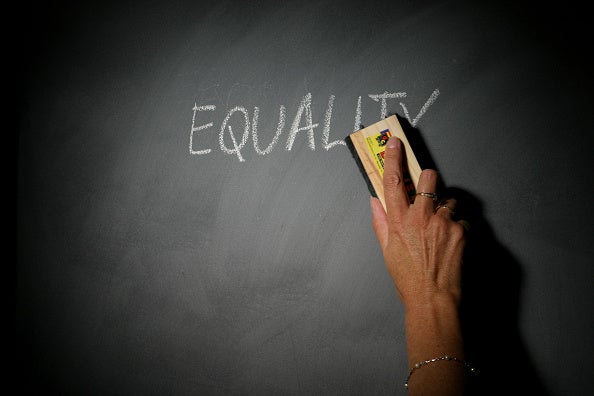A teenager on how misogyny is even more damaging than we imagine
Schools and universities should be making a far more concerted effort to stamp out sexism before it becomes ingrained

“I was raping a woman last night and she cried.” This was how a fresher’s week event at Cardiff Metropolitan University was advertised to students in 2013. Last year, a Durham University rugby club played a drinking game called “It’s not rape if …” and for female students starting at Emmanuel College, Cambridge, the student newspaper reported on a leaked email encouraging members of an all-male drinking society to “smash it”. The “it” they were referring to, in case the subtleties were lost on you, were the girls.
At other universities, there are points systems if you “f*** a fresher” (even better if you take her virginity or keep her underwear) and initiations for clubs and societies routinely involve young women being forced or pressured into giving lap dances, simulating oral sex or removing items of clothing.
At the University of Nottingham, a video was posted online showing a number of first-year students chanting lines including: 'F*** her standing, f*** her lying. If she had wings I’d f*** her flying. Now she’s dead, but not forgotten, Dig her up and f*** her rotten.'
This year, an Oxford University college had to warn of an “unprecedented” scale of groping and sexual harassment. In July this year, a new survey found that British universities are failing to tackle ‘lad culture’ and this month a new report showed unacceptable levels of sexual assault at schools, and the overwhelming number of victims will be girls.
Enough yet? These are just a drop in the ocean of a misogynistic tsunami that faces young British girls today.
Speaking as a teenager, this country’s girls and young women are under even more pressure than the media makes apparent. Bearing the brunt of sexism in real life is but enough, but now with the added penalty of this new digital landscape, the situation is truly dire.
Sites like ask.fm mean that strangers can ask demeaning questions and taunt girls online. Girls are consistently pressured to ‘sext’ – to send explicit sexual messages or pictures to boyfriends or would be boyfriends only to have these distributed around school and to be labelled a ‘slut’ while the swans off as the ‘stud’.
Bullying is just as damaging, but now it has becomes utterly incessant thanks to the web. Then there are the messages that inhabiting a female body is a problem in its own right; school uniform rules uniformly punish girls for ‘distracting’ boys or male staff. Messages that girls aren’t and will never be good enough are just as pervasive now as they have always been.
Calling yourself a feminist in the midst of all this remains, and it really shouldn’t, a radical act. Being a feminist as a teenage girl can be difficulty and isolating experience as bullying ‘the outsider’ (again, mad that this is the case) takes its toll.
I have friends who have been threatened with suspension and expulsion for undertaking feminist actions at school. At some schools, petitions are banned. I learned of a teenage girl who created a petition to change uniform rules for the girls at her school, only to have her petition ripped up by her Headmaster in her school assembly.
In the following weeks, thousands of girls and young women will return to schools, colleges and universities. But we have to ask ourselves – are these institutions doing enough for girls and young women? In my experience, institutions are more interested in ‘saving face’ and never take these allegations and problems seriously enough.
When I was harassed by a boy online, I told a member of staff. She openly laughed. In a few hours, those messages would be published online by the same boy and his friends, making me the talk of my school. I didn’t dare step into the dining room for nearly a week.
Universities simply do not take the issue of sexual harassment and assault seriously enough. A National Union of Students’ (NUS) survey found 37 per cent of female students had experienced unwanted groping or inappropriate touching and a further 36 per cent had experienced sexual comments about their body, compared to 16 percent of male students. A Guardian investigation in May found fewer than half of Russell Group universities monitor the extent of sexual violence against students, while one in six publishes guidelines on reporting such allegations. Furthermore, an NUS survey found that only half of UK universities have formal policies on sexual harassment.
It has become more and more apparent that the combined pressure from school and society is taking its toll on girls and young women. And for that to change, we must begin to listen to girls and to take these issues seriously. When we don’t challenge these problems, be it at school or university, we are signalling that sexismis acceptable, and that kind of education is toxic. The underlying message from our inaction is that we not only tell girls that schools are not safe spaces for them, but that the world isn’t either.
Join our commenting forum
Join thought-provoking conversations, follow other Independent readers and see their replies
Comments